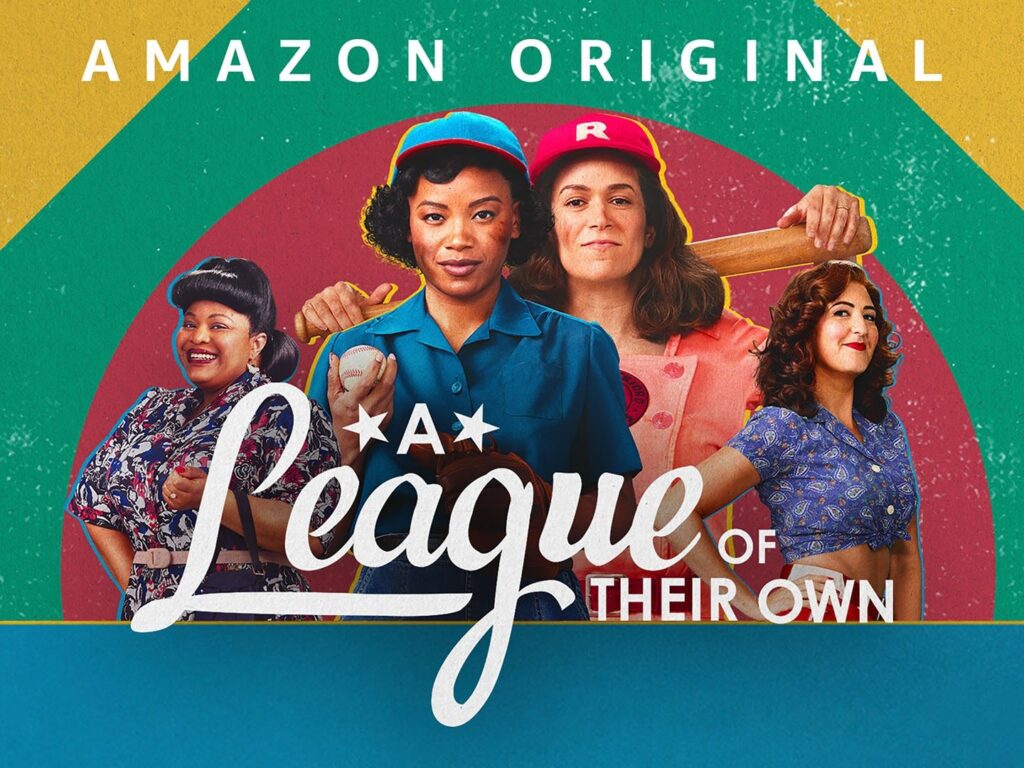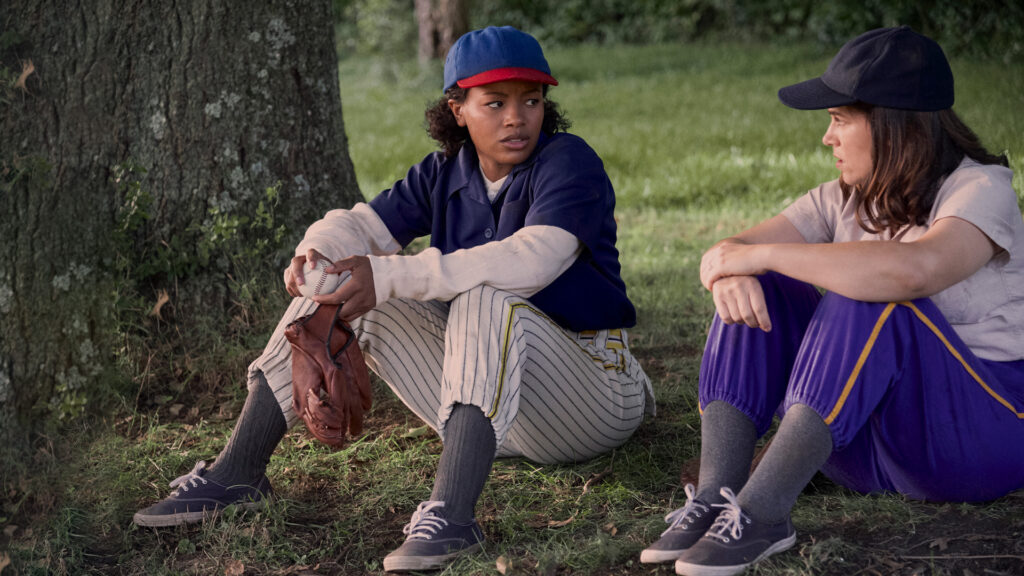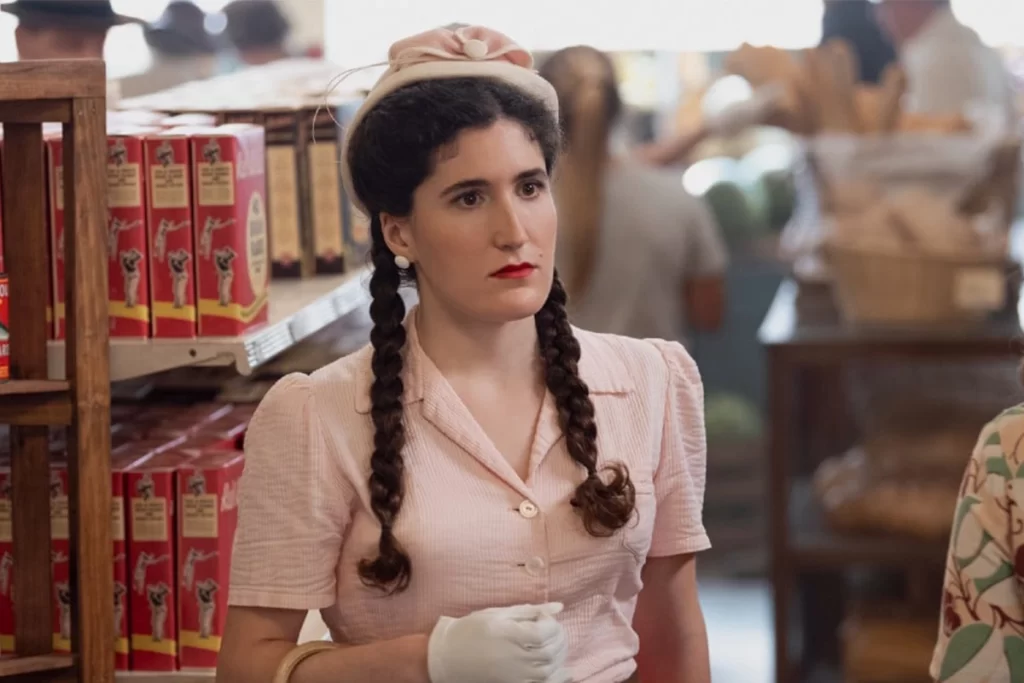Jewish Comedy and Jewish Erasure on Amazon Prime’s A League of Their Own
In a groundbreaking show where many characters have thoughtful backstories on race, sexuality, and gender, the Jewish character’s is sorely lacking

(Amazon promotional image for A League of Their Own)
Like many lesbian women, I have found myself enamored with Amazon Prime’s newly reimagined A League of Their Own. The show, co-written and co-produced by comic thinkers Abbi Jacobson (Broad City) and Will Graham (Mozart in the Jungle, Onion News Network), premiered on August 12, 2022 with an eight-episode season. Like the 1992 film on which it is based, League’s first season takes place in 1943, at the height of WWII when men are being drafted in droves. The show follows the development of the Rockford Peaches, a woman’s professional baseball team that played in the All-American Girls Professional Baseball League (AAGPBL) from 1943 through 1954. Like the film, League is based on the historical Peaches, but broadcasting thirty years later has the cultural space to explore aspects of the AAGPBL and its players that the original movie could only hint at but not address: racial segregation, homosexuality, and gender bending. While the season explores these areas with considerable care and nuance, I am left questioning the role of Jewishness—or perhaps more rightly Jewish stereotypes—in the show’s 1940s setting.
To provide some background: Professional American baseball teams, in both the show and in actuality, were comprised of white and white-enough players. In the 1940s, Black American ballplayers were forced to play separately, in what was called the Negro League, until Jackie Robinson played as a Brooklyn Dodger in 1947 (the Negro league officially disbanded in 1948). While there are two Latinx players and one Jewish player on The Peaches in League, the rest, as far as we know in Season 1, are white as understood in mid-twentieth century United States.
Instead of following these players alone, League, unlike the film, also follows the Negro League, and focuses especially on Maxine Chapman (Chanté Adams), a Black pitcher who throws faster, harder, and has more passion for baseball than most of her male or female counterparts. Shortly into the series, we learn that Chapman is a lesbian who lands on the gender performance spectrum toward what we today might call a “Chapstick lesbian.” At one point in the show, in fact, she and Peaches player Carson Shaw discuss needing a term for lesbian women such as themselves—those who are neither butch nor femme, but rather somewhere in-between. At least there is a term now.
Shaw, played by Jacobson, is a catcher for the Peaches, and becomes the team’s coach when their assigned coach bails. Once she is on the team, she realizes quickly that, although married to a man, she is gay, and falls for fellow teammate, Greta Gill (D’Arcy Carden). Their feelings are mutual—Gill makes the first move, in fact—and viewers are invited to watch, alongside scenes of other lesbian players, the complexities of women loving women. There is friendship. There is flirting. And there is sex—lots of it.
League is not all fun and games, of course. After all, racism was rampant in 1940s America, and homosexuality was outlawed. Certain friendships, romantic partnerships, and family stories that showcase the broader world of gender nonconformity (Adams, for instance, has a transmasculine uncle, Bertie, played by Lea Robinson) unfold behind closed doors; fears of stepping out or getting caught are palatable. The Latinx players, too, discuss how they are treated differently from other players on the team. They have to act more “in line” in order to be treated with the same respect as their white teammates.

(A scene from A League of Their Own)
Engaging this kind of human and social complexity is what has granted the show much praise. As writer Katie Heaney reflects upon the show and an interview she conducted with series co-writer Abbi Jacobson, she attests:
“I’m happy to report the show is excellent. I expected to laugh, and did; I did not expect to cry, and did—a lot. Jacobson and Graham’s reboot is not, as so many reboots tend to be, an itchy, ill-fitting eye patch slapped over a beloved story’s blind spots. The queer and Black stories here aren’t supplemental to the story; they are the story.”
And as the story, the show makes clear that these characters are beloved. League displays the harshness of America’s historical reality, but it also celebrates those who have been historically harmed. It celebrates gay women. It celebrates women of color. It celebrates gender nonconformity. This kind of storytelling is powerful; it shows people the pains of reality, yes, but it does so while offering alternative possibilities to racist, sexist, and heteronormative worlds. By creating characters that are belovedly against-the-grain of the white, cisgender, straight norm, League creates avenues for viewers to push against their own worlds’ boundaries and, in turn, to celebrate new and diverse identities.
We have, in fact, already seen the effects of this work. Maybelle Blair, a player on the historical Peaches, came out publicly when the show was featured at a Tribeca theater in June 2022. She was 95 years old. I have no doubt other lesbian viewers, after seeing themselves on screen—seeing themselves loved on screen—will come out, too.
League, of course, cannot investigate the complexity of all human experiences—no show can. Still, though, I find myself wanting more. There is one character, in fact, that I find in desperate need of further exploration and nuance—further basic development, even. This character is Shirley Cohen (Kate Berlant), an eventual Peach we meet in the season’s first episode. Despite Cohen’s love of baseball, viewers quickly learn that her personality centers around something else: anxiety. Cohen is worried about everything, from germs to disease—especially botulism, for some reason—to the inevitability of death. She is so neurotic, in fact, that her anxiety bleeds into homophobia; she is afraid that homosexuality is contagious, and practices OCD-like rituals to protect herself from catching it.
Cohen is also the only known Jew on the team.
I find it noteworthy that, while many League characters are given thoughtful backstories, the Jewish one’s is sorely lacking. Cohen is, put simply, a walking (throwing? batting?) stereotype of anxious Jews. Even Cohen’s positive attributes are wrapped in anti-Jewish stereotypes: she is fantastic at calculating baseball statistics. Jews, in other words, may be over-the-top in their neurosis, but at least they are smart, especially when it comes to counting numbers.
Numbers.
Again, the show’s first season takes place in 1943. Surely there is a reason for Shirley’s anxiety. Surely the player knows that many Jews are being tattooed in preparation for mass extermination. After all, the entire backdrop of the show—the very reason these women are invited to play ball—is because men are being drafted for the Second World War.
And yet, not once does the show gesture toward the Holocaust. While Hitler’s name is mentioned, the extermination of millions, predominately Jews, is not. But maybe there is a reason for this. Maybe most Americans in 1943 did not yet know what was happening under the Third Reich. It is also possible that Cohen’s character has no personal ties to Europe; perhaps her knowledge of the war is dependent upon non-Jewish American conversations. It seems equally possible, though, that Cohen does have ties to Europe, and that her family in the States has lost contact with their loved ones overseas. It is also equally possible that Americans, regardless of their ethnic or religious background, did know about the ramifications of Hitler’s antisemitic nationalism.

(Shirley Cohen played by Kate Berlant in A League of Their Own)
Still, maybe Cohen’s anxiety need not be tied to WWII. Jews, after all, have been killed in masses long before the 1940s, so much so that critical race theorist J. Kameron Carter argues that racism originates in Christian anti-Judaism; in biologizing Jews as innately inferior—worthy of extermination in the minds of many throughout history—Christianity especially, Carter asserts, paved the way for the construct of race and, with it, racism. Perhaps, then, there are cultural and historical reasons for Jewish anxiety. Perhaps Cohen’s fear of botulism is a projected fear of historically plausible extermination, regardless of her knowledge of Third Reich practices. And perhaps that fear of extermination could have been explored in Cohen’s character.
Or maybe the show’s lack of Jewish exploration is purposeful. Co-writer Abbi Jacobson, after all, is Jewish. Maybe we are meant to live in the unexamined stereotype until next season when the psychology of Jewry will be revealed, thereby forcing us to confront whatever Season 1 stereotypes some viewers let roll by without question or critique.
Or maybe not. Many Jews have a habit of perpetuating Jewish deprecation, especially in comic circles. While, for example, Rachel Bloom’s and Aline Brosh McKenna’s award-winning—and very Jewish—Crazy Ex-Girlfriend makes productive space for non-conforming characters (among other things, it has been described as groundbreaking for casting a Filipino-American man as the show’s main love interest), it still leans into the idea that Jews are loud, neurotic, and overbearing (see, for instance, the musical number, “Where’s the Bathroom?”). And do I as a Jew enjoy this work? Yes. Extremely. I happen to be married to a Jewish comic, and find myself laughing hardest when she is making fun of Jews. I perpetuate this kind of thinking in my own world, too—that is, not just through my laughing at Jewish self-deprecation on screen or stage, but also in my use of it in social interactions. I self-deprecate the most, in fact, when I am in conversation with fellow progressives. I don’t want anyone to assume I have an endless flow of money or harbor hatred toward Palestinians, for instance, so I make fun of myself as a Jew in an effort to disarm them of their potential assumptions. If I laugh at myself for being an asthmatic anxious Jew with stomach problems living in a one-bedroom shtetl, surely they will know that I am not secretly running the world.
There are plenty of theories as to why Jewish self-deprecation is so prevalent, especially in Jewish comedy. Some of the most oft-noted ideas include: 1) Jewish self-deprecation creates room for self-reflection with a little more ease; 2) there is resilience in making fun of ourselves before others can; and/or 3) there is survival in claiming one’s Jewishness in a way that isn’t too Jewish (if we make fun of our Judaism, we get to name our Jewishness while also separating ourselves from it, thereby making us the “cool” Jew in a non-Jewish world).
I have to ask, though: what happens when Jewish characters are so often satirized on screen—by Jews, no less? Are we, in making fun of ourselves, even in our attempts to combat antisemitism, actually contributing to antisemitism? Are we, in our laughter, fostering the invisibility of Jews as a minoritized culture? Why, for instance, are Jews, even after centuries of being persecuted and in making up roughly 0.2% of the global population, so easily overlooked as a targeted group? Why do we dismiss so quickly anti-Jewish bigotry?
These questions are not unique; they have been asked and answered for decades by thinkers engaging an array of fields and subfields. I remain intrigued, however, by the psychological theory that internalized antisemitism is in part to blame. As psychologists Evelyn Torton Beck, Julie L. Goldberg, and L. Lee Knefelkamp explain:
“American Jews are not living in organized ghettos or camps like many of their Jewish ancestors, U.S. society as a whole has tended to trivialize and dismiss as insignificant the effects of centuries of historical and current anti-Semitism on Jews today and to ignore the importance of Jewish identity as a foundation for Jews’ psychological well-being…One powerful effect is the internalizing of anti-Semitism—a psychological process in which the vilifying, menacing messages of anti-Jewish oppression are absorbed and converted into self-hatred, shame, and fear of being identified with Jews.”
Indeed, as I’ve written elsewhere on this topic, the trivializing of Jewish Otherness is a form of antisemitism that paves the way for Jews to minimize and even mock their communal experiences. Anti-Jewish stereotypes are so ingrained into our beings that we cannot step away, so much so that we, in regurgitating our atmospheric bigotry, contribute to its repeated making—in our conversations, in our comedies, in our TV shows.
Let me be clear: I love—and I mean love—A League of Their Own. I extend profound gratitude to Jacobson and Graham and the entire production team for making this show. As a late-to-come-out lesbian, I crave stories like this. I think, in fact, that I would have known I was gay much earlier if I had grown up with more. For while lesbians like Shaw and Adams and Gills have always existed, they have historically been silenced—closeted. This has profound effects. Not only does it foster further silencing from lesbians like them, but it also leaves generations of people unsure or even unknowing of who they are. Lesbian stories—ones that are joyful and, if I may, hot—help audiences internalize that same-sex love is real and that our world has room for more. More love. More nuance. More complexity. More gay.
I do worry, though, about Shirley Cohen, and not just because she is ridden with psychic pain. I worry that she—or really rather we, as in we Jews—in creating or overlooking or laughing at antisemitic caricatures of ourselves such as Cohen, keep the world from celebrating us.
Sarah Emanuel is Assistant Professor of New Testament Studies at Loyola Marymount University in Los Angeles, CA. She resides on the coast with her wife, Zoë, and their stereotypically lesbian farm of four dogs and two cats.